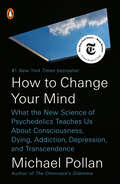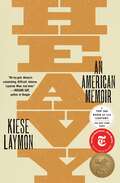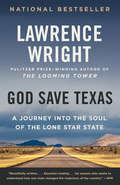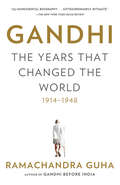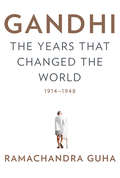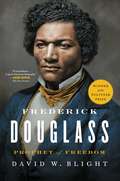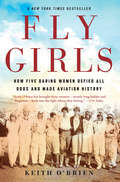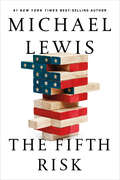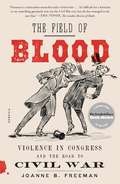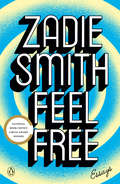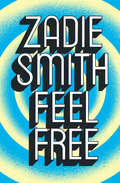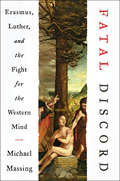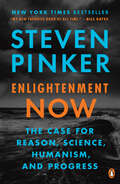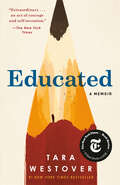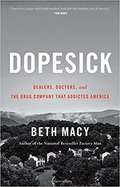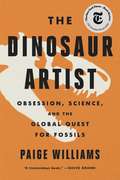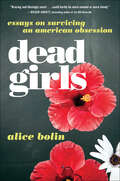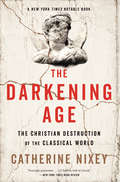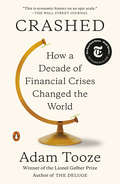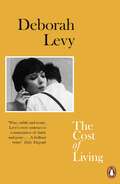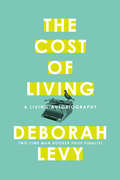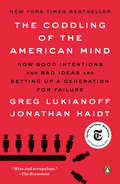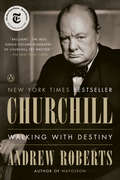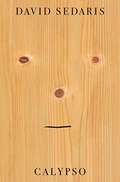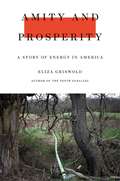Special Collections
100 Notable Books of 2018
- Table View
- List View
How to Change Your Mind
by Michael PollanNew York Times Book Review 10 Best Books of 2018A New York Times Notable Book The #1 New York Times bestseller.A brilliant and brave investigation into the medical and scientific revolution taking place around psychedelic drugs--and the spellbinding story of his own life-changing psychedelic experiences When Michael Pollan set out to research how LSD and psilocybin (the active ingredient in magic mushrooms) are being used to provide relief to people suffering from difficult-to-treat conditions such as depression, addiction and anxiety, he did not intend to write what is undoubtedly his most personal book. But upon discovering how these remarkable substances are improving the lives not only of the mentally ill but also of healthy people coming to grips with the challenges of everyday life, he decided to explore the landscape of the mind in the first person as well as the third. Thus began a singular adventure into various altered states of consciousness, along with a dive deep into both the latest brain science and the thriving underground community of psychedelic therapists. Pollan sifts the historical record to separate the truth about these mysterious drugs from the myths that have surrounded them since the 1960s, when a handful of psychedelic evangelists inadvertently catalyzed a powerful backlash against what was then a promising field of research.A unique and elegant blend of science, memoir, travel writing, history, and medicine, How to Change Your Mind is a triumph of participatory journalism. By turns dazzling and edifying, it is the gripping account of a journey to an exciting and unexpected new frontier in our understanding of the mind, the self, and our place in the world. The true subject of Pollan's "mental travelogue" is not just psychedelic drugs but also the eternal puzzle of human consciousness and how, in a world that offers us both suffering and joy, we can do our best to be fully present and find meaning in our lives.
Heavy
by Kiese LaymonIn this powerful and provocative memoir, genre-bending essayist and novelist Kiese Laymon explores what the weight of a lifetime of secrets, lies, and deception does to a black body, a black family, and a nation teetering on the brink of moral collapse.
Kiese Laymon is a fearless writer. In his essays, personal stories combine with piercing intellect to reflect both on the state of American society and on his experiences with abuse, which conjure conflicted feelings of shame, joy, confusion and humiliation. Laymon invites us to consider the consequences of growing up in a nation wholly obsessed with progress yet wholly disinterested in the messy work of reckoning with where we’ve been. In Heavy, Laymon writes eloquently and honestly about growing up a hard-headed black son to a complicated and brilliant black mother in Jackson, Mississippi.
From his early experiences of sexual violence, to his suspension from college, to his trek to New York as a young college professor, Laymon charts his complex relationship with his mother, grandmother, anorexia, obesity, sex, writing, and ultimately gambling. By attempting to name secrets and lies he and his mother spent a lifetime avoiding, Laymon asks himself, his mother, his nation, and us to confront the terrifying possibility that few in this nation actually know how to responsibly love, and even fewer want to live under the weight of actually becoming free.
A personal narrative that illuminates national failures, Heavy is defiant yet vulnerable, an insightful, often comical exploration of weight, identity, art, friendship, and family that begins with a confusing childhood—and continues through twenty-five years of haunting implosions and long reverberations.
Winner of the 2018 Andrew Carnegie Medal for Non-Fiction
God Save Texas
by Lawrence WrightWith humor and the biting insight of a native, the Pulitzer Prize-winning author of The Looming Tower explores the history, culture, and politics of Texas, while holding the stereotypes up for rigorous scrutiny.
God Save Texas is a journey through the most controversial state in America. It is a red state in the heart of Trumpland that hasn't elected a Democrat to a statewide office in more than twenty years; but it is also a state in which minorities already form a majority (including the largest number of Muslims). The cities are blue and among the most diverse in the nation.
Oil is still king but Texas now leads California in technology exports. The Texas economic model of low taxes and minimal regulation has produced extraordinary growth but also striking income disparities.
Texas looks a lot like the America that Donald Trump wants to create. And Wright's profound portrait of the state not only reflects our country back as it is, but as it was and as it might be.
A New York Times Bestseller
Gandhi
by Ramachandra GuhaThe second and concluding volume of the magisterial biography that began with the acclaimed, Gandhi Before India: the definitive portrait of the life and work of one of the most abidingly influential--and controversial--men in world history.
This volume opens with Mohandas Gandhi's arrival in Bombay in January 1915 and takes us through his epic struggles over the next three decades: to deliver India from British rule, to forge harmonious relations between India's Hindu and Muslim populations, to end the pernicious Hindu practice of untouchability, and to develop India's economic and moral self-reliance. We see how in each of these campaigns, Gandhi adapted methods of nonviolence--strikes, marches, fasts--that successfully challenged British authority, religious orthodoxy, social customs, and would influence non-violent, revolutionary movements throughout the world.
In reconstructing Gandhi's life and work, Ramachandra Guha has drawn on sixty different archival collections, the most significant among them, a previously unavailable collection of papers belonging to Gandhi himself.
Using this wealth of material, Guha creates a portrait of Gandhi and of those closest to him--family, friends, political and social leaders--that illuminates the complexity inside his thinking, his motives, his actions and their outcomes as he engaged with every important aspect of social and public life in the India of his time.
Gandhi
by Ramachandra GuhaAn epic and revelatory biography of one of the most abidingly influential--and controversial--men in modern history.Opening with Gandhi's triumphant return to India in 1915 after decades abroad, and ending with his tragic assassination in 1949, Gandhi: The Years that Changed the World is a remarkable, moving portrait that provides a crucial re-evaluation of India's iconic leader for a new generation.
Drawing on a wealth of newly uncovered materials unavailable to previous biographers, acclaimed historian and author Ramachandra Guha brings the past to life with extraordinary grace and clarity. Deploying his gifts as a storyteller and scholar, Guha presents Gandhi as both a fascinating human being--a man of fierce hope, eccentric personal beliefs, and sometimes dark and alarming contradictions--as well as a dynamic political force and global icon.
Sharp, insightful, balanced, and impeccably researched, this free-standing sequel to Guha's magisterial biography Gandhi Before India is an indispensable resource for a contemporary understanding of Gandhi's ever-evolving legacy.
Frederick Douglass
by David W. Blight**Winner of the Pulitzer Prize in History** &“Extraordinary…a great American biography&” (The New Yorker) of the most important African-American of the nineteenth century: Frederick Douglass, the escaped slave who became the greatest orator of his day and one of the leading abolitionists and writers of the era.As a young man Frederick Douglass (1818–1895) escaped from slavery in Baltimore, Maryland. He was fortunate to have been taught to read by his slave owner mistress, and he would go on to become one of the major literary figures of his time. His very existence gave the lie to slave owners: with dignity and great intelligence he bore witness to the brutality of slavery. Initially mentored by William Lloyd Garrison, Douglass spoke widely, using his own story to condemn slavery. By the Civil War, Douglass had become the most famed and widely travelled orator in the nation. In his unique and eloquent voice, written and spoken, Douglass was a fierce critic of the United States as well as a radical patriot. After the war he sometimes argued politically with younger African Americans, but he never forsook either the Republican party or the cause of black civil and political rights. In this &“cinematic and deeply engaging&” (The New York Times Book Review) biography, David Blight has drawn on new information held in a private collection that few other historian have consulted, as well as recently discovered issues of Douglass&’s newspapers. &“Absorbing and even moving…a brilliant book that speaks to our own time as well as Douglass&’s&” (The Wall Street Journal), Blight&’s biography tells the fascinating story of Douglass&’s two marriages and his complex extended family. &“David Blight has written the definitive biography of Frederick Douglass…a powerful portrait of one of the most important American voices of the nineteenth century&” (The Boston Globe). In addition to the Pulitzer Prize, Frederick Douglass won the Bancroft, Parkman, Los Angeles Times (biography), Lincoln, Plutarch, and Christopher awards and was named one of the Best Books of 2018 by The New York Times Book Review, The Wall Street Journal, The Boston Globe, The Chicago Tribune, The San Francisco Chronicle, and Time.
Fly Girls
by Keith O'BrienThe untold story of five women who fought to compete against men in the high-stakes national air races of the 1920s and 1930s — and won Between the world wars, no sport was more popular, or more dangerous, than airplane racing. Thousands of fans flocked to multi‑day events, and cities vied with one another to host them. The pilots themselves were hailed as dashing heroes who cheerfully stared death in the face. Well, the men were hailed.
Female pilots were more often ridiculed than praised for what the press portrayed as silly efforts to horn in on a manly, and deadly, pursuit. Fly Girls recounts how a cadre of women banded together to break the original glass ceiling: the entrenched prejudice that conspired to keep them out of the sky.
O’Brien weaves together the stories of five remarkable women: Florence Klingensmith, a high‑school dropout who worked for a dry cleaner in Fargo, North Dakota; Ruth Elder, an Alabama divorcee; Amelia Earhart, the most famous, but not necessarily the most skilled; Ruth Nichols, who chafed at the constraints of her blue‑blood family’s expectations; and Louise Thaden, the mother of two young kids who got her start selling coal in Wichita.
Together, they fought for the chance to race against the men — and in 1936 one of them would triumph in the toughest race of all.
Like Hidden Figures and Girls of Atomic City, Fly Girls celebrates a little-known slice of history wherein tenacious, trail-blazing women braved all obstacles to achieve greatness.
The Fifth Risk
by Michael LewisWhat are the consequences if the people given control over our government have no idea how it works?
"The election happened," remembers Elizabeth Sherwood-Randall, then deputy secretary of the Department of Energy. "And then there was radio silence." Across all departments, similar stories were playing out: Trump appointees were few and far between; those that did show up were shockingly uninformed about the functions of their new workplace. Some even threw away the briefing books that had been prepared for them.
Michael Lewis’s brilliant narrative takes us into the engine rooms of a government under attack by its own leaders. In Agriculture the funding of vital programs like food stamps and school lunches is being slashed. The Commerce Department may not have enough staff to conduct the 2020 Census properly. Over at Energy, where international nuclear risk is managed, it’s not clear there will be enough inspectors to track and locate black market uranium before terrorists do.
Willful ignorance plays a role in these looming disasters. If your ambition is to maximize short-term gains without regard to the long-term cost, you are better off not knowing those costs. If you want to preserve your personal immunity to the hard problems, it’s better never to really understand those problems. There is upside to ignorance, and downside to knowledge. Knowledge makes life messier. It makes it a bit more difficult for a person who wishes to shrink the world to a worldview.
If there are dangerous fools in this book, there are also heroes, unsung, of course. They are the linchpins of the system—those public servants whose knowledge, dedication, and proactivity keep the machinery running. Michael Lewis finds them, and he asks them what keeps them up at night.
A New York Times Bestseller
The Field of Blood
by Joanne B. FreemanIn The Field of Blood, Joanne B. Freeman recovers the long-lost story of physical violence on the floor of the U.S. Congress. Drawing on an extraordinary range of sources, she shows that the Capitol was rife with conflict in the decades before the Civil War.
Legislative sessions were often punctuated by mortal threats, canings, flipped desks, and all-out slugfests. When debate broke down, congressmen drew pistols and waved Bowie knives. One representative even killed another in a duel. Many were beaten and bullied in an attempt to intimidate them into compliance, particularly on the issue of slavery.
These fights didn’t happen in a vacuum. Freeman’s dramatic accounts of brawls and thrashings tell a larger story of how fisticuffs and journalism, and the powerful emotions they elicited, raised tensions between North and South and led toward war. In the process, she brings the antebellum Congress to life, revealing its rough realities—the feel, sense, and sound of it—as well as its nation-shaping import.
Funny, tragic, and rivetingly told, The Field of Blood offers a front-row view of congressional mayhem and sheds new light on the careers of John Quincy Adams, Henry Clay, and other luminaries, as well as introducing a host of lesser-known but no less fascinating men. The result is a fresh understanding of the workings of American democracy and the bonds of Union on the eve of their greatest peril.
Feel Free
by Zadie SmithArranged into five sections--In the World, In the Audience, In the Gallery, On the Bookshelf, and Feel Free--this new collection poses questions we immediately recognize.
What is The Social Network--and Facebook itself--really about?
"It's a cruel portrait of us: 500 million sentient people entrapped in the recent careless thoughts of a Harvard sophomore."
Why do we love libraries?
"Well-run libraries are filled with people because what a good library offers cannot be easily found elsewhere: an indoor public space in which you do not have to buy anything in order to stay."
What will we tell our granddaughters about our collective failure to address global warming?
"So I might say to her, look: the thing you have to appreciate is that we'd just been through a century of relativism and deconstruction, in which we were informed that most of our fondest-held principles were either uncertain or simple wishful thinking, and in many areas of our lives we had already been asked to accept that nothing is essential and everything changes--and this had taken the fight out of us somewhat."
Feel Free
by Zadie SmithA timely, powerful collection of essays from one of our sharpest minds and most sparkling stylists.
How much joy can a person tolerate? How many kinds of boredom make up a life? Who owns the story of black America? Should Justin Bieber be more like Socrates? And why is there a dead art collector floating in the swimming pool?
Dazzlingly insightful, explosively funny and ever-timely, Zadie Smith is back with a second unmissable collection of essays. From German Old Masters to the new masters of East Coast rap, from social networks opening lines of communication to national referenda closing doors, Feel Free reaches out in all directions and draws back a rich feast of ideas. Here pop culture, high culture, social change and political debate all get the Zadie Smith treatment: dissected with razor-sharp intellect, set brilliantly against the context of the utterly contemporary, and considered with a deep humanity and compassion.
With the easy intimacy of a local and the piercing clarity of an outsider, Feel Free casts a sharp critical eye over the creative luminaries that have shaped our world: from J. G. Ballard to Karl Ove Knausgaard, Orson Welles to Charlie Kaufman, Joni Mitchell to Beyonce, and far beyond. And it considers the points of contact where the author herself meets this world, where the political meets the personal and critique meets memoir. This electrifying new collection showcases Zadie Smith as a true literary powerhouse, demonstrating once again her credentials as an essential voice of her generation.
Fatal Discord
by Michael MassingThe “riveting” story of Erasmus, Martin Luther, and the rivalry between the reformer and the dissident: “An impressive, powerful intellectual history.” —Kirkus Reviews (starred review)At a time when Leonardo, Michelangelo, and Raphael were revolutionizing Western art and culture, Erasmus of Rotterdam was helping to transform Europe’s intellectual and religious life, developing a new design for living for a continent rebelling against the hierarchical constraints of the Roman Church. When in 1516 he came out with a revised edition of the New Testament based on the original Greek, he was hailed as the prophet of a new enlightened age. Today, however, Erasmus is largely forgotten, and the reason can be summed up in two words: Martin Luther. As a young friar in remote Wittenberg, Luther was initially a great admirer of Erasmus and his critique of the Catholic Church, but while Erasmus sought to reform that institution from within, Luther wanted a more radical transformation. Eventually, the differences between them flared into a bitter rivalry, with each trying to win over Europe to his vision.In Fatal Discord, Michael Massing seeks to restore Erasmus to his proper place in the Western tradition. The conflict between him and Luther, he argues, forms a fault line in Western thinking—the moment when two enduring schools of thought, Christian humanism and evangelical Christianity, took shape. A seasoned journalist who has reported from many countries, Massing here travels back to the early sixteenth century to recover a long-neglected chapter of Western intellectual life, in which the introduction of new ways of reading the Bible set loose social and cultural forces that helped shatter the millennial unity of Christendom and whose echoes can still be heard today in the cultural differences between America and Europe. “A sprawling narrative around the rift between the two men, laying out the sociological, political and economic factors that shaped both them and Europe’s responses to them.” —The New York Times
Enlightenment Now
by Steven PinkerIf you think the world is coming to an end, think again. Steven Pinker presents the big picture of human progress: people are living longer, healthier, freer, and happier lives, and while our problems are formidable, the solutions lie in the Enlightenment ideal of using reason and science.Is the world really falling apart? Is the ideal of progress obsolete?
In this elegant assessment of the human condition in the third millennium, cognitive scientist and public intellectual Steven Pinker urges us to step back from the gory headlines and prophecies of doom, which play to our psychological biases.
Instead, follow the data: In seventy-five jaw-dropping graphs, Pinker shows that life, health, prosperity, safety, peace, knowledge, and happiness are on the rise, not just in the West, but worldwide. This progress is not the result of some cosmic force. It is a gift of the Enlightenment: the conviction that reason and science can enhance human flourishing.Far from being a naïve hope, the Enlightenment, we now know, has worked. But more than ever, it needs a vigorous defense.
The Enlightenment project swims against currents of human nature--tribalism, authoritarianism, demonization, magical thinking--which demagogues are all too willing to exploit. Many commentators, committed to political, religious, or romantic ideologies, fight a rearguard action against it. The result is a corrosive fatalism and a willingness to wreck the precious institutions of liberal democracy and global cooperation. With intellectual depth and literary flair, Enlightenment Now makes the case for reason, science, and humanism: the ideals we need to confront our problems and continue our progress.
A New York Times Bestseller
Educated
by Tara WestoverAn unforgettable memoir about a young girl who, kept out of school, leaves her survivalist family and goes on to earn a PhD from Cambridge University.
Tara Westover was seventeen the first time she set foot in a classroom. Born to survivalists in the mountains of Idaho, she prepared for the end of the world by stockpiling home-canned peaches and sleeping with her “head-for-the-hills” bag. In the summer she stewed herbs for her mother, a midwife and healer, and in the winter she salvaged metal in her father’s junkyard.
Her father distrusted the medical establishment, so Tara never saw a doctor or nurse. Gashes and concussions, even burns from explosions, were all treated at home with herbalism. The family was so isolated from mainstream society that there was no one to ensure the children received an education, and no one to intervene when an older brother became violent.
When another brother got himself into college and came back with news of the world beyond the mountain, Tara decided to try a new kind of life. She taught herself enough mathematics, grammar, and science to take the ACT and was admitted to Brigham Young University. There, she studied psychology, politics, philosophy, and history, learning for the first time about pivotal world events like the Holocaust and the Civil Rights Movement.
Her quest for knowledge transformed her, taking her over oceans and across continents, to Harvard and to Cambridge University. Only then would she wonder if she’d traveled too far, if there was still a way home. Educated is an account of the struggle for self-invention. It is a tale of fierce family loyalty, and of the grief that comes from severing one’s closest ties.
With the acute insight that distinguishes all great writers, Westover has crafted a universal coming-of-age story that gets to the heart of what an education is and what it offers: the perspective to see one’s life through new eyes, and the will to change it.
A New York Times Bestseller
Dopesick
by Beth MacyThe only book to fully chart the devastating opioid crisis in America: "a harrowing, deeply compassionate dispatch from the heart of a national emergency" (New York Times) from a bestselling author and journalist who has lived through itIn this masterful work, Beth Macy takes us into the epicenter of America's twenty-plus year struggle with opioid addiction.
From distressed small communities in Central Appalachia to wealthy suburbs; from disparate cities to once-idyllic farm towns; it's a heartbreaking trajectory that illustrates how this national crisis has persisted for so long and become so firmly entrenched.
Beginning with a single dealer who lands in a small Virginia town and sets about turning high school football stars into heroin overdose statistics, Macy endeavors to answer a grieving mother's question-why her only son died-and comes away with a harrowing story of greed and need.
From the introduction of OxyContin in 1996, Macy parses how America embraced a medical culture where overtreatment with painkillers became the norm. In some of the same distressed communities featured in her bestselling book Factory Man, the unemployed use painkillers both to numb the pain of joblessness and pay their bills, while privileged teens trade pills in cul-de-sacs, and even high school standouts fall prey to prostitution, jail, and death.
Through unsparing, yet deeply human portraits of the families and first responders struggling to ameliorate this epidemic, each facet of the crisis comes into focus.
In these politically fragmented times, Beth Macy shows, astonishingly, that the only thing that unites Americans across geographic and class lines is opioid drug abuse. But in a country unable to provide basic healthcare for all, Macy still finds reason to hope-and signs of the spirit and tenacity necessary in those facing addiction to build a better future for themselves and their families.
A New York Times Bestseller
The Dinosaur Artist
by Paige WilliamsIn 2012, a New York auction catalogue boasted an unusual offering: "a superb Tyrannosaurus skeleton." In fact, Lot 49135 consisted of a nearly complete T. bataar, a close cousin to the most famous animal that ever lived. The fossils now on display in a Manhattan event space had been unearthed in Mongolia, more than 6,000 miles away. At eight-feet high and 24 feet long, the specimen was spectacular, and when the gavel sounded the winning bid was over $1 million.
Eric Prokopi, a thirty-eight-year-old Floridian, was the man who had brought this extraordinary skeleton to market. A onetime swimmer who spent his teenage years diving for shark teeth, Prokopi's singular obsession with fossils fueled a thriving business hunting, preparing, and selling specimens, to clients ranging from natural history museums to avid private collectors like actor Leonardo DiCaprio.
But there was a problem. This time, facing financial strain, had Prokopi gone too far? As the T. bataar went to auction, a network of paleontologists alerted the government of Mongolia to the eye-catching lot. As an international custody battle ensued, Prokopi watched as his own world unraveled.
In the tradition of The Orchid Thief, The Dinosaur Artist is a stunning work of narrative journalism about humans' relationship with natural history and a seemingly intractable conflict between science and commerce. A story that stretches from Florida's Land O' Lakes to the Gobi Desert, The Dinosaur Artist illuminates the history of fossil collecting--a murky, sometimes risky business, populated by eccentrics and obsessives, where the lines between poacher and hunter, collector and smuggler, enthusiast and opportunist, can easily blur.
In her first book, Paige Williams has given readers an irresistible story that spans continents, cultures, and millennia as she examines the question of who, ultimately, owns the past.
Dead Girls
by Alice Bolin“[A] deliciously dry, moody essay collection” about America’s obsession with violence against women is “a lyrical meditation” (Carina Chocano, New York Times Book Review).In this poignant collection, Alice Bolin examines iconic American works from the essays of Joan Didion and James Baldwin to Twin Peaks, Britney Spears, and Serial, illuminating the widespread obsession with women who are abused, killed, and disenfranchised, and whose bodies (dead and alive) are used as props to bolster men’s stories. Smart and accessible, thoughtful and heartfelt, Bolin investigates the implications of our cultural fixations, and her own role as a consumer and creator.Bolin chronicles her life in Los Angeles, dissects the Noir, revisits her own coming of age, and analyzes stories of witches and werewolves, both appreciating and challenging the narratives we construct and absorb every day. Dead Girls begins by exploring the trope of dead women in fiction, and ends by interrogating the more complex dilemma of living women – both the persistent injustices they suffer and the oppression that white women help perpetrate.“Bracing and blazingly smart.” —Megan Abbott, Edgar Award–winning author of You Will Know Me“The cultural criticism serves to help us all think a little bit more about what we’re consuming—and who’s being damaged by it.” —Entertainment Weekly“[A] sharp-eyed book of essays.” —Washington Post“Wise and wonderful.” —Robin Wasserman, author of Girls on Fire“Engrossing . . . eerily enthralling, systematically on point, and quite funny . . . An illuminating study on the role women play in the media and in their own lives.” —Kirkus Reviews (starred review)“Smart, thorough, and urgent, Bolin’s essays are a force to be reckoned with.” —Booklist
The Darkening Age
by Catherine NixeyA bold new history of the rise of Christianity, showing how its radical followers ravaged vast swathes of classical culture, plunging the world into an era of dogma and intellectual darkness
In Harran, the locals refused to convert. They were dismembered, their limbs hung along the town’s main street. In Alexandria, zealots pulled the elderly philosopher-mathematician Hypatia from her chariot and flayed her to death with shards of broken pottery. Not long before, their fellow Christians had invaded the city’s greatest temple and razed it—smashing its world-famous statues and destroying all that was left of Alexandria’s Great Library.
Today, we refer to Christianity’s conquest of the West as a “triumph.” But this victory entailed an orgy of destruction in which Jesus’s followers attacked and suppressed classical culture, helping to pitch Western civilization into a thousand-year-long decline. Just one percent of Latin literature would survive the purge; countless antiquities, artworks, and ancient traditions were lost forever.
As Catherine Nixey reveals, evidence of early Christians’ campaign of terror has been hiding in plain sight: in the palimpsests and shattered statues proudly displayed in churches and museums the world over. In The Darkening Age, Nixey resurrects this lost history, offering a wrenching account of the rise of Christianity and its terrible cost.
Crashed
by Adam ToozeFrom a prizewinning economic historian, an eye-opening reinterpretation of the 2008 economic crisis (and its ten-year aftermath) as a global event that directly led to the shockwaves being felt around the world today.
In September 2008 President George Bush could still describe the financial crisis as an incident local to Wall Street. In fact it was a dramatic caesura of global significance that spiraled around the world, from the financial markets of the UK and Europe to the factories and dockyards of Asia, the Middle East, and Latin America, forcing a rearrangement of global governance. In the United States and Europe, it caused a fundamental reconsideration of capitalist democracy, eventually leading to the war in the Ukraine, the chaos of Greece, Brexit, and Trump.
It was the greatest crisis to have struck Western societies since the end of the Cold War, but was it inevitable? And is it over? Crashed is a dramatic new narrative resting on original themes: the haphazard nature of economic development and the erratic path of debt around the world; the unseen way individual countries and regions are linked together in deeply unequal relationships through financial interdependence, investment, politics, and force; the ways the financial crisis interacted with the spectacular rise of social media, the crisis of middle-class America, the rise of China, and global struggles over fossil fuels. Finally, Tooze asks, given this history, what now are the prospects for a liberal, stable, and coherent world order?
The Cost of Living
by Deborah LevyThe audacious and elegiac second installment in her 'living autobiography' on writing and womanhood, from the twice-Man Booker Prize-shortlisted author of Hot Milk and Swimming HomeFollowing the acclaimed Things I Don't Want to Know, Deborah Levy returns to the subject of her life in letters. The Cost of Living reveals a writer in radical flux, considering what it means to live with value and meaning and pleasure. This perfectly crafted snapshot of a woman in the process of transformation is as distinctive, wide-ranging and original as Levy's acclaimed novels, an essential read for every Deborah Levy fan.
The Cost of Living
by Deborah LevyCrystalline, witty and audacious, The Cost of Living addresses itself to the dual experiences of writing and of womanhood, examining what is essential in each. Following the acclaimed Things I Don't Want to Know, which reflected deeply on the nature of gender politics and a life in letters, The Cost of Living returns to the same subject and to the same life, to find a writer in radical flux. If a woman dismantles her life, expands it and puts it back together in a new shape, how might she describe this new composition? "Words have to open the mind. When words close the mind you can be sure that someone has been reduced to nothingness."
In this elegiac second instalment of her "living autobiography", Deborah Levy considers what it means to live with value and meaning and pleasure. The Cost of Living is a vital and astonishing testimony, as distinctive, wide-ranging and original as Levy's acclaimed novels.
The Coddling of the American Mind
by Jonathan Haidt and Greg LukianoffSomething is going wrong on many college campuses in the last few years. Rates of anxiety, depression, and suicide are rising. Speakers are shouted down. Students and professors say they are walking on eggshells and afraid to speak honestly. How did this happen?
First Amendment expert Greg Lukianoff and social psychologist Jonathan Haidt show how the new problems on campus have their origins in three terrible ideas that have become increasingly woven into American childhood and education: what doesn’t kill you makes you weaker; always trust your feelings; and life is a battle between good people and evil people. These three Great Untruths are incompatible with basic psychological principles, as well as ancient wisdom from many cultures. They interfere with healthy development. Anyone who embraces these untruths—and the resulting culture of safetyism—is less likely to become an autonomous adult able to navigate the bumpy road of life.
Lukianoff and Haidt investigate the many social trends that have intersected to produce these untruths. They situate the conflicts on campus in the context of America’s rapidly rising political polarization, including a rise in hate crimes and off-campus provocation. They explore changes in childhood including the rise of fearful parenting, the decline of unsupervised play, and the new world of social media that has engulfed teenagers in the last decade.
This is a book for anyone who is confused by what is happening on college campuses today, or has children, or is concerned about the growing inability of Americans to live, work, and cooperate across party lines.
A New York Times Bestseller
Churchill
by Andrew RobertsIn this landmark biography of Winston Churchill based on extensive new material, the true genius of the man, statesman and leader can finally be fully seen and understood--by the bestselling, award-winning author of Napoleon and The Storm of War
When we seek an example of great leaders with unalloyed courage, the person who comes to mind is Winston Churchill: the iconic, visionary war leader immune from the consensus of the day, who stood firmly for his beliefs when everyone doubted him. But how did young Winston become Churchill? What gave him the strength to take on the superior force of Nazi Germany when bombs rained on London and so many others had caved? In Churchill, Andrew Roberts gives readers the full and definitive Winston Churchill, from birth to lasting legacy, as personally revealing as it is compulsively readable.
Roberts gained exclusive access to extensive new material: transcripts of War Cabinet meetings, diaries, letters and unpublished memoirs from Churchill's contemporaries. The Royal Family permitted Roberts--in a first for a Churchill biographer--to read the detailed notes taken by King George VI in his diary after his weekly meetings with Churchill during World War II. This treasure trove of access allows Roberts to understand the man in revelatory new ways, and to identify the hidden forces fueling Churchill's legendary drive.
We think of Churchill as a hero who saved civilization from the evils of Nazism and warned of the grave crimes of Soviet communism, but Roberts's masterwork reveals that he has as much to teach us about the challenges leaders face today--and the fundamental values of courage, tenacity, leadership and moral conviction.
A New York Times Bestseller
Calypso
by David SedarisDavid Sedaris returns with his most deeply personal and darkly hilarious book.
If you've ever laughed your way through David Sedaris's cheerfully misanthropic stories, you might think you know what you're getting with Calypso. You'd be wrong.
When he buys a beach house on the Carolina coast, Sedaris envisions long, relaxing vacations spent playing board games and lounging in the sun with those he loves most. And life at the Sea Section, as he names the vacation home, is exactly as idyllic as he imagined, except for one tiny, vexing realization: it's impossible to take a vacation from yourself.
With Calypso, Sedaris sets his formidable powers of observation toward middle age and mortality. Make no mistake: these stories are very, very funny--it's a book that can make you laugh 'til you snort, the way only family can.
Sedaris's powers of observation have never been sharper, and his ability to shock readers into laughter unparalleled. But much of the comedy here is born out of that vertiginous moment when your own body betrays you and you realize that the story of your life is made up of more past than future.
This is beach reading for people who detest beaches, required reading for those who loathe small talk and love a good tumor joke. Calypso is simultaneously Sedaris's darkest and warmest book yet--and it just might be his very best.
A New York Times Bestseller
Amity and Prosperity
by Eliza GriswoldIn Amity and Prosperity, the prizewinning poet and journalist Eliza Griswold tells the story of the energy boom’s impact on a small town at the edge of Appalachia and one woman’s transformation from a struggling single parent to an unlikely activist.
Stacey Haney is a local nurse working hard to raise two kids and keep up her small farm when the fracking boom comes to her hometown of Amity, Pennsylvania. Intrigued by reports of lucrative natural gas leases in her neighbors’ mailboxes, she strikes a deal with a Texas-based energy company. Soon trucks begin rumbling past her small farm, a fenced-off drill site rises on an adjacent hilltop, and domestic animals and pets start to die. When mysterious sicknesses begin to afflict her children, she appeals to the company for help. Its representatives insist that nothing is wrong.
Alarmed by her children’s illnesses, Haney joins with neighbors and a committed husband-and-wife legal team to investigate what’s really in the water and air. Against local opposition, Haney and her allies doggedly pursue their case in court and begin to expose the damage that’s being done to the land her family has lived on for centuries. Soon a community that has long been suspicious of outsiders faces wrenching new questions about who is responsible for their fate, and for redressing it: The faceless corporations that are poisoning the land? The environmentalists who fail to see their economic distress? A federal government that is mandated to protect but fails on the job? Drawing on seven years of immersive reporting, Griswold reveals what happens when an imperiled town faces a crisis of values, and a family wagers everything on an improbable quest for justice.
